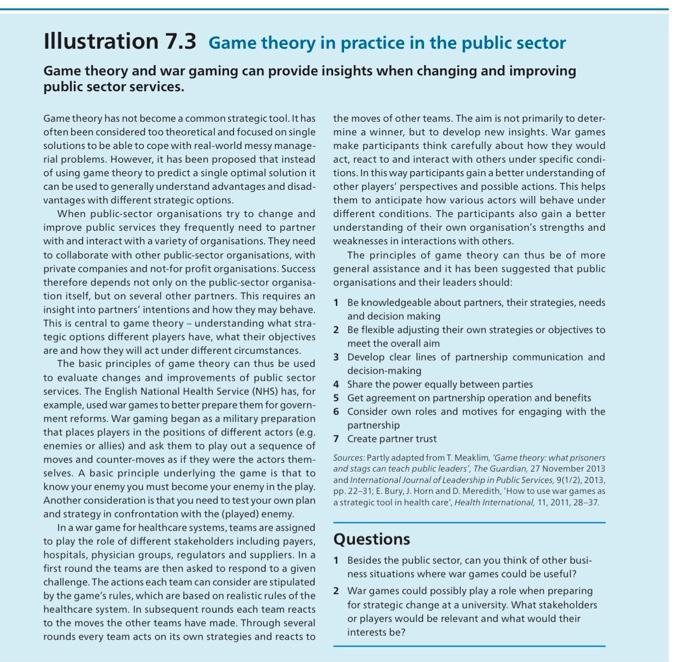Answered step by step
Verified Expert Solution
Question
1 Approved Answer
Illustration 7.3 Game theory in practice in the public sector Game theory and war gaming can provide insights when changing and improving public sector

Illustration 7.3 Game theory in practice in the public sector Game theory and war gaming can provide insights when changing and improving public sector services. Game theory has not become a common strategic tool. It has often been considered too theoretical and focused on single solutions to be able to cope with real-world messy manage- rial problems. However, it has been proposed that instead of using game theory to predict a single optimal solution it can be used to generally understand advantages and disad- vantages with different strategic options. When public-sector organisations try to change and improve public services they frequently need to partner with and interact with a variety of organisations. They need to collaborate with other public-sector organisations, with private companies and not-for profit organisations. Success therefore depends not only on the public-sector organisa- tion itself, but on several other partners. This requires an insight into partners' intentions and how they may behave. This is central to game theory - understanding what stra- tegic options different players have, what their objectives are and how they will act under different circumstances. The basic principles of game theory can thus be used to evaluate changes and improvements of public sector services. The English National Health Service (NHS) has, for example, used war games to better prepare them for govern- ment reforms. War gaming began as a military preparation that places players in the positions of different actors (e.g. enemies or allies) and ask them to play out a sequence of moves and counter-moves as if they were the actors them- selves. A basic principle underlying the game is that to know your enemy you must become your enemy in the play. Another consideration is that you need to test your own plan and strategy in confrontation with the (played) enemy. In a war game for healthcare systems, teams are assigned to play the role of different stakeholders including payers, hospitals, physician groups, regulators and suppliers. In a first round the teams are then asked to respond to a given challenge. The actions each team can consider are stipulated by the game's rules, which are based on realistic rules of the healthcare system. In subsequent rounds each team reacts to the moves the other teams have made. Through several rounds every team acts on its own strategies and reacts to the moves of other teams. The aim is not primarily to deter- mine a winner, but to develop new insights. War games make participants think carefully about how they would act, react to and interact with others under specific condi- tions. In this way participants gain a better understanding of other players' perspectives and possible actions. This helps them to anticipate how various actors will behave under different conditions. The participants also gain a better understanding of their own organisation's strengths and weaknesses in interactions with others. The principles of game theory can thus be of more general assistance and it has been suggested that public organisations and their leaders should: 1 Be knowledgeable about partners, their strategies, needs and decision making 2 Be flexible adjusting their own strategies or objectives to meet the overall aim 3 Develop clear lines of partnership communication and decision-making Share the power equally between parties 4 5 Get agreement on partnership operation and benefits 6 Consider own roles and motives for engaging with the partnership 7 Create partner trust Sources: Partly adapted from T. Meaklim, 'Game theory: what prisoners and stags can teach public leaders, The Guardian, 27 November 2013 and International Journal of Leadership in Public Services, 9(1/2), 2013, pp. 22-31; E. Bury, J. Horn and D. Meredith, "How to use war games as a strategic tool in health care, Health International, 11, 2011, 28-37. Questions 1 Besides the public sector, can you think of other busi- ness situations where war games could be useful? 2 War games could possibly play a role when preparing for strategic change at a university. What stakeholders or players would be relevant and what would their interests be?
Step by Step Solution
★★★★★
3.36 Rating (152 Votes )
There are 3 Steps involved in it
Step: 1
Besides the public sector can you think of other business situations where war games could be useful The capacity of war gaming to get inside the heads of different players is usually beneficial when ...
Get Instant Access to Expert-Tailored Solutions
See step-by-step solutions with expert insights and AI powered tools for academic success
Step: 2

Step: 3

Ace Your Homework with AI
Get the answers you need in no time with our AI-driven, step-by-step assistance
Get Started


